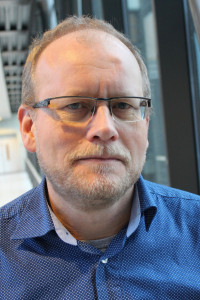Associate professor

Interaction of sleep and circadian rhythms. Sleep is regulated by circadian and homeostatic mechanisms. Both are known to influence sleep and related variables, like alertness and cognitive performance. Whether the two influence each other is less clear. By measuring sleep and circadian clock functioning under different conditions (sleep deprived, jet lagged) we haves shown that the amplitude of the circadian clock and its responsiveness to light is reduced when an animal is sleep deprived.
Sleep, circadian rhythms and aging. Sleep and circadian rhythms change in the course of aging. Recently, we showed that mice sleep more and deeper when they age. This is in contrast with humans who generally tend to sleep less and less deep in the course of aging. Currently we investigate the influence of perinatal photoperiod (day length) on sleep and circadian rhythms in adulthood.
Sleep mechanisms. By applying drugs and making use of knockout models we investigate how sleep and waking are regulated. Recently, we have performed experiments with caffeine and other agonists and antagonists of the adenosine receptor on wildtype and knockout mouse models to investigate the working mechanism of sleep induction by adenosine release in the brain.
I studied biology at the University of Groningen, the Netherlands, and performed the work for my PhD thesis at the institute of Pharmacology and Toxicology at the University of Zürich, Switzerland. My work there focused on the relationship between sleep and hibernation. For this I received my PhD from the University of Groningen. After that I spent time as a post-doc at the department of Veterinary Medicine of the University of Pennsylvania in Philadelphia, USA, where I worked on rapid-eye movement sleep regulation. During a subsequent post-doc at the institute of Pharmacology and Toxicology at the University of Zürich I worked on different knockout mouse models (prion protein, cytokines, K+-channels) and sleep regulation. Subsequently I moved to Leiden as a postdoc in Prof J. H. Meijers group, where I started working on the relationship between circadian rhythms and sleep.
I was a member of the scientific committee of the Dutch Sleep-Wake Research Society from 2004 to 2014, and chair of the scientific committee and member of the board from 2009-2014. I was a member of the scientific committee of the European Sleep Research Society (ESRS) from 2012-2016, the last two years as chair. After that I was a member of the board of the ESRS from 2016-2022 as Assistant Secretary (2016-2018) and Vice-president Basic research (2018-2022).
Since 2013 I am an Associate professor in the Neurophysiology group. In addition, at present I am an Associate editor of the Journal of Sleep Research and Editorial board member of Clocks and Sleep.
Panagiotou, M.; Papagioannopoulos, K.; Rohling, J.H.T.; Meijer, J.H.; Deboer, T.
Front. Aging Neurosci., 2018, 10: 233. doi: 10.3389/fnagi.2018.00233.
Borbely, A.A.; Daan, S.; Wirz-Justice, A.; Deboer T.
J. Sleep. Res., 2016, 25, 131-143. Doi: 10.1111/jsr.12371.
Fifel, K; Yanagisawa, M.; Deboer, T.
Adv Sci (Weinh)., 2023, 10: e2203170. Doi: 10.1002/advs.202203170



Looking for information on one of our topics, a new place to conduct your research or experienced research to join forces with? Feel free to contact us.!